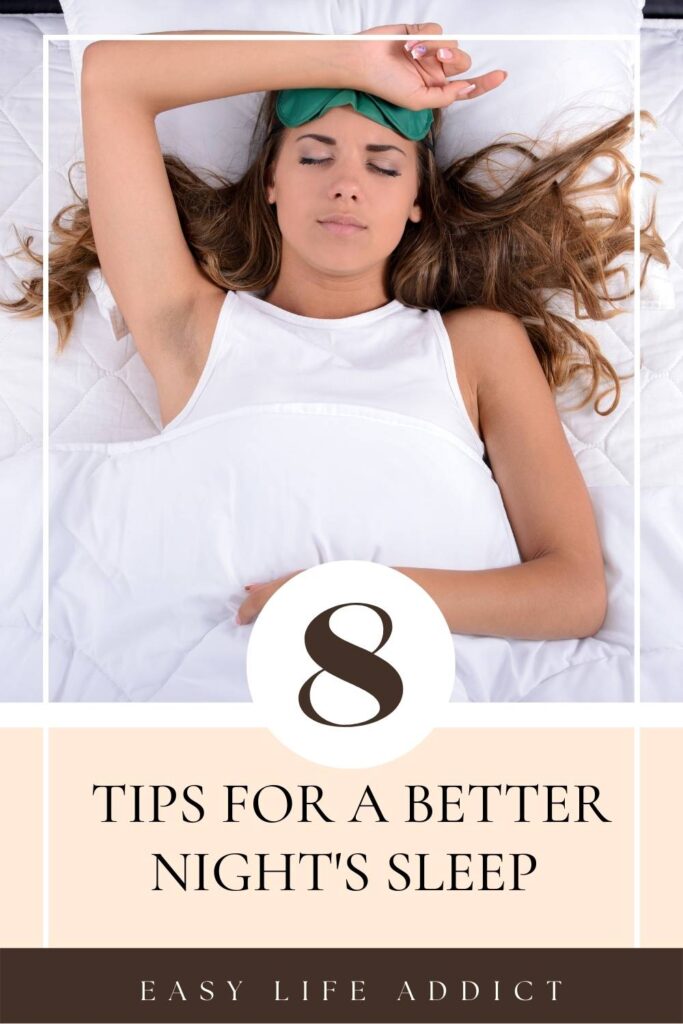9 Tips for a Better Night’s Sleep!
We all know how important sleep is for our overall health and well-being. Yet, many of us don’t get enough quality shut-eye regularly. If you want to improve your sleep habits, check out these eight tips for a better night’s sleep. By making some simple changes, you can enjoy a more restful slumber and wake up refreshed and rejuvenated!
This post may contain affiliate links. That means that if you click on a link and purchase something I recommend, I will receive a small commission at no extra cost to you. As an Amazon Associate, I earn from qualifying purchases. This helps keep my website up and running and is very appreciated. Thank you for your support! You can read my full disclosure policy here.
9 Tips for a better night’s sleep:

Sleep is essential for our health and well-being, but sometimes, getting a good night’s rest can be hard. If you’re having trouble sleeping, here are a few things you can do to try and improve the situation:
1. Establish a regular sleep schedule
Establishing a regular sleep schedule is one of the best ways to improve your sleep quality. Going to bed and waking up at the same time each day helps to regulate your body’s natural sleep rhythm, making it easier to fall asleep and stay asleep.
2. Create a relaxing bedtime routine
Another way to promote better sleep is to create a relaxing bedtime routine. This could involve taking a warm bath, reading a book, or doing gentle stretching exercises. The goal is to wind down and prepare your body for sleep.
3. Keep a cool, comfortable bedroom environment
Your bedroom environment can also impact your sleep quality. Ensure your room is dark, quiet, and cool; around 65 degrees Fahrenheit is ideal. Also, consider using blackout curtains or an eye mask to block out any unwanted light.
4. Limit screen time before bed
It’s also important to limit your screen time before bed. The blue light emitted by electronic devices can disrupt your body’s natural sleep rhythm, making it more difficult to fall asleep. If you must use a device before bed, try dimmed settings or blue-light-blocking glasses.
5. Avoid caffeine before bed
Caffeine is a stimulant that can keep you awake and make it harder to fall asleep. Avoid caffeine late afternoon and evening, especially if you have trouble sleeping at night.
6. Avoid alcohol before bed
While alcohol may make you feel drowsy at first, it can disrupt your sleep later in the night. Alcohol consumption has been linked with poorer sleep quality and increased wakefulness during the night. So, it’s best to avoid alcohol in the hours leading up to bedtime.
7. Foods to avoid
Certain foods can interfere with sleep, making it more difficult to fall asleep and stay asleep through the night. So, if you’re struggling to get a restful night’s sleep, try avoiding these foods before bedtime:
Sugary snacks – A sugary snack before bed might seem like a good idea, but the sugar rush can make it harder to sleep.
Spicy foods – Spicy foods can cause heartburn and indigestion, which can lead to restless nights.
Heavy meals – Eating a big meal right before bed can cause indigestion and make sleeping difficult.
8. Get regular exercise
Regular exercise has numerous benefits for your health, including improved sleep quality. Exercise helps to promote deeper, more restful sleep by reducing stress and anxiety levels and improving the function of your circadian rhythm, the internal process that regulates your sleep-wake cycle. Just be sure not to exercise too close to bedtime, as this can be a stimulant and make it harder to fall asleep.
9. Manage stress levels
Chronic stress can take a toll on your physical and mental health, including your sleep quality. If you’re struggling with stress or anxiety, there are several things you can do to manage it, such as practising relaxation techniques, exercising regularly, and journaling.
When to seek professional help?
Most of us have experienced a sleepless night or two at some point. But for some people, insomnia is a chronic problem that can wreak havoc on their health and well-being. If you’re struggling to get a good night’s sleep regularly, it’s important to consult with a doctor to rule out any underlying medical conditions. Insomnia can be caused by a wide variety of factors, including hormonal imbalances, anxiety disorders, and certain medications. A doctor can help identify the cause of your insomnia and recommend the best treatment.
Final thoughts
If you’re looking for ways to get a better night’s sleep, try some of these tips. Not only will you feel more rested and alert during the day, but you’ll also be less likely to suffer from health problems down the road. What is your favourite way to get a good night’s sleep?
Remember to check out our related resources for more health and well-being tips. Take control of your health and embrace a brighter future!
Thanks so much for stopping by; I appreciate everyone who takes the time to read and make it to the end! I have lots of exciting new content in the next few weeks, so make sure you pop back to catch up!









